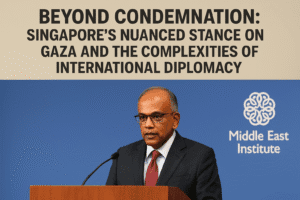Beyond Condemnation: Singapore’s Nuanced Stance on Gaza and the Complexities of International Diplomacy
Singapore’s Foreign Minister has issued a stern historical judgment, stating Israel’s actions in Gaza have “gone too far” and likely breached international law. The criticism centers on a concerning shift in Israeli strategy, arguing powerful leaders now aim to prevent a Palestinian state by outright rejecting the two-state solution. While its moral condemnation is unequivocal, Singapore defends its pragmatic decision to maintain diplomatic ties. It argues that cutting relations would be a hollow gesture, eliminating its behind-the-scenes influence and proving inconsistent when compared to other global conflicts.
Ultimately, Singapore’s stance is a nuanced blend of principle and realpolitik, firmly condemning the offensive while retaining the diplomatic channels needed to advocate for the only solution it believes offers lasting peace: a viable two-state future.

Beyond Condemnation: Singapore’s Nuanced Stance on Gaza and the Complexities of International Diplomacy
In the crowded theatre of global opinion on the Israel-Gaza conflict, nations often choose a simple role: either fervent supporter or vocal critic. Singapore, however, is performing a more complex part, one that balances moral clarity with diplomatic pragmatism. A recent speech by the nation’s top security official offers a masterclass in this delicate act.
Speaking at the Middle East Institute’s annual conference, Singapore’s Coordinating Minister for National Security, K. Shanmugam, delivered a statement that was both strikingly candid and meticulously measured. His words, echoing earlier sentiments from Prime Minister Lawrence Wong, provide a clear window into how a small, rule-of-law nation navigates a deeply polarizing international crisis.
A Harsh Historical Verdict, Delivered in the Present
The most powerful takeaway was Shanmugam’s projection of history’s judgment. He stated plainly that Israel’s actions in Gaza have “gone too far” and that “history will probably be harsh in its judgment.” This is not off-the-cuff rhetoric; it is a calculated, weighty condemnation from a minister known for his legal precision.
By invoking history, Singapore is doing more than criticizing current policy. It is framing Israel’s military campaign within a broader moral and legal continuum, suggesting that the ongoing offensive will be remembered alongside other historical transgressions. This aligns with Singapore’s repeated assertion that the actions represent a “likely breach of international humanitarian law”—a formal legal conclusion that carries significant weight.
The Core Grievance: A Rejection of a Two-State Future
Beyond the immediate violence, Singapore pinpointed a deeper, more existential concern. Shanmugam identified what he sees as the root driver: “a desire to take actions which will prevent a Palestinian state,” noting that some Israeli leaders “categorically reject a two-state solution.”
This insight shifts the focus from tactical operations to strategic objective. Singapore’s alarm is not just about the scale of the response but its perceived ultimate goal—the foreclosure of the only internationally accepted framework for a lasting peace. This frames the conflict not as a cycle of violence but as a battle over the very possibility of a Palestinian future, a concern that resonates deeply with a nation that itself fought for sovereign recognition.
The Pragmatism of Engagement: Why Cutting Ties Isn’t the Answer
The most insightful part of Shanmugam’s address came when he was asked the obvious question: If Singapore feels so strongly, why not downgrade or sever diplomatic ties with Israel as a show of condemnation?
His response was a lesson in realpolitik from a small state. He argued that cutting ties would be both ineffective and inconsistent.
- Ineffective: “How is that going to help the people of Gaza? How will that give us any hope of continuing to speak with the Israeli government and putting forward our viewpoints?” For Singapore, diplomacy is a tool, not a trophy. Severing contact burns bridges and eliminates any remaining influence, however modest, to advocate for restraint and humanitarian aid behind the scenes. Shanmugam noted that Israel listens to Singapore due to their long-standing relations, a channel that would be lost with a symbolic but ultimately empty gesture.
- Inconsistent: He pointed to a stark double standard. The world is filled with brutal conflicts—in Syria, Yemen, Myanmar, and Ukraine. If nations were to cut diplomatic ties with every country whose actions they condemn, global diplomacy would grind to a halt. “You should be cutting off ties with Russia,” he said, “and on the basis of what I just outlined, you should be cutting off ties with the United States, France, Britain; all of whom have been supplying weapons to many of these conflicts.” His point was that selective outrage undermines the principled consistency that gives a small nation’s foreign policy its credibility.
The Unwavering North Star: The Two-State Solution
Amid the grim realism, Singapore’s position is ultimately anchored in a stubborn hope. The government has consistently supported the Palestinians’ right to a homeland based on a two-state solution. Shanmugam conceded that the pathway is currently invisible, but he insisted that it remains the “only way a comprehensive, just, durable solution to the conflict can be achieved.”
“The Palestinians deserve no less,” he said, “so we have to hold out hope.”
This final note is crucial. It confirms that Singapore’s criticism stems not from animosity but from a commitment to a principle it believes is the only route to lasting security for both Israelis and Palestinians. It is a hope tempered by reality but refused to be abandoned.
In conclusion, Singapore’s stance is a nuanced blend of moral outrage and diplomatic calculation. It offers a model for how to be a critical voice without becoming an irrelevant one. It condemns the action in the strongest terms possible without resorting to symbolic acts that would silence its own voice. For readers watching this conflict unfold, Singapore’s approach provides a valuable case study in how to navigate an intractable crisis with both principle and pragmatism intact.
You must be logged in to post a comment.